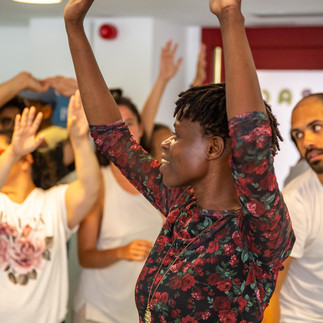Exploring the Impact of the PRISCILA Pilot in Spain: A Unique Approach to Empowering Migrants
- La Xixa

- Jan 7, 2025
- 3 min read
Updated: Jun 26, 2025
The PRISCILA workshop in Barcelona, Spain, brought together diverse groups and innovative methodologies to foster personal, social, learning-to-learn, cultural awareness, and citizenship competences among migrants, refugees, and asylum seekers, including in particular the LGBTQI+ community within this target group. Organised jointly by ACATHI and La Xixa, the pilot successfully combined expertise in intersectionality and participatory education, showcasing a participant-centred approach that not only empowered individuals but also set a benchmark for inclusive learning practices.

ACATHI, a Barcelona-based organisation supporting LGBTQI+ migrants and refugees, partnered with La Xixa, known for its innovative use of participatory methodologies for social transformation. This collaboration enabled the pilot to offer a rich, inclusive learning experience tailored to the participants' diverse needs. The sessions were held at Espai d’entitats LaFede.cat, a space that provided both functionality and a welcoming atmosphere.
Key Highlights of the Pilot
Diverse and Inclusive Participation:
The pilot engaged 27 participants across three sessions, representing a spectrum of nationalities, identities, and experiences.
Participants included individuals from Latin America, Europe, and Africa, with a significant presence of LGBTQI+ community members.
Innovative Methodologies:
Theatre of the Oppressed: Participants explored social issues through interactive storytelling and collective problem-solving.
Deep Democracy: This methodology encouraged discussions around privilege, power dynamics, and group and individual identity.
Critical Incident: Participants reflected on cultural shocks and stereotypes, fostering empathy and self-awareness.
Participant-Centered Learning:
The workshops incorporated self-assessment tools to issue micro-credentials, empowering participants to recognise their own competencies and assess their own learning process, and diverse quality assurance activities to collect feedback before, during and after the training. These activities ensured that the training maintained its high standard and provided valuable insights for further improvement.
Informal activities like shared lunches and coffee breaks strengthened team dynamics, creating a supportive learning environment.

Challenges and Adaptations
A cornerstone of the PRISCILA pilot was the development of a participant-centred certification system, leveraging a European learning platform like Europass to integrate micro-credits and provide formal recognition of acquired competences. Participants engaged in self-assessment processes using detailed observation grids, evaluating their progress at the beginning and end of the pilot. This approach empowered learners to take ownership of their growth while providing measurable outcomes.
The self-assessment process, though complex initially, was continually refined to ensure clarity and ease of use. Feedback from participants and trainers alike confirmed its effectiveness, attesting to its success in promoting self-awareness and learning progression. The adaptability of this tool reinforces the idea that PRISCILA’s methodology can evolve to meet diverse needs while maintaining its innovative spirit.
Outcomes and Feedback
The feedback from participants and facilitators was positive. Key outcomes included:
Enhanced cultural awareness and interpersonal skills.
Improved problem-solving and critical thinking abilities.
Empowerment through recognition of their competencies and contributions.
Participants highlighted the importance of the safe, inclusive environment and expressed a desire for the sessions to continue. Trainers also praised the effectiveness of the methodologies and the potential for broader application in other educational contexts.
Looking Ahead
The PRISCILA pilot has demonstrated the power of innovative, inclusive education in addressing the challenges faced by migrant and refugee communities. Its success underscores the importance of participant-centered approaches and the value of fostering empathy and understanding through shared experiences.
As the project moves forward, the insights and methodologies developed during the pilot will inform future initiatives, ensuring that more individuals can benefit from this transformative approach. The PRISCILA method not only empowers participants but also serves as a model for organizations worldwide aiming to promote inclusivity and lifelong learning.
The PRISCILA pilot in Spain stands as a testament to the impact of collaboration, diversity, and innovative education. Our partnership (ACATHI/La Xixa) was fundamental in overcoming challenges and ensuring the project’s transformative impact on participants and communities. By creating a space where participants could learn, grow, and connect, the project has laid a foundation for continued success and meaningful change. One participant aptly summarised the experience: “The sessions helped me recognise myself to better understand and embrace other realities.”
The PRISCILA pilot in Spain demonstrates that with the right tools and a commitment to inclusivity, education can become a transformative force. By addressing societal challenges through innovative methods, the project not only empowered participants but also paved the way for a more empathetic and interconnected world.
Would you like to know all the details about the PRISCILA Pilot experience in Spain? Download the Pilot Report today!
.png)






















